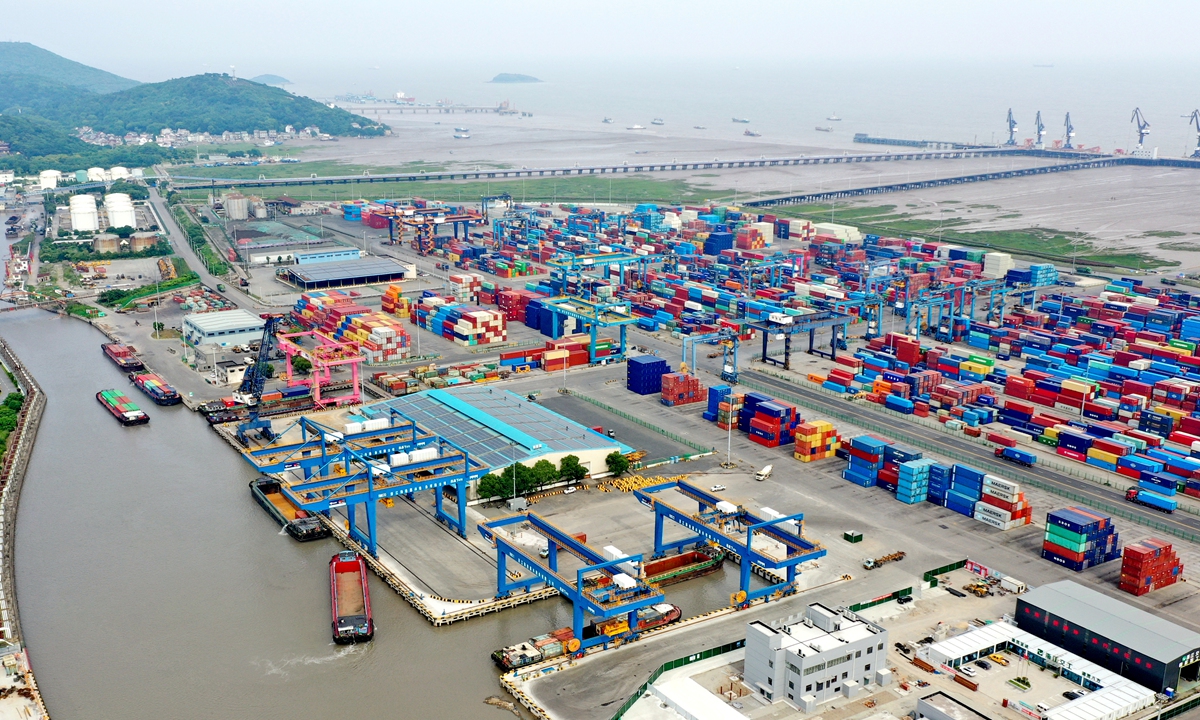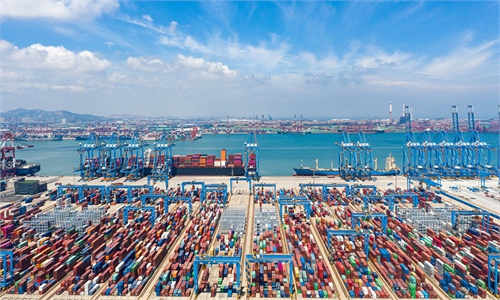Beilun, core of Ningbo Zhoushan Port, sees limited impact amid new round of epidemic controls

Containers are loaded on barges at a port in Jiaxing, East China's Zhejiang Province on June 16, 2022. The throughput of containers that were shipped between oceangoing vessels and river-going vessels saw a sharp increase of 69.4 percent year-on-year during the first five months of 2022, according to Ningbo Zhoushan Port Group. Photo: Courtesy of Ningbo Zhoushan Port Group
Beilun, core of Ningbo Zhoushan Port in East China's Zhejiang Province, has tightened epidemic control measures after new COVID-19 cases were reported, which posed new challenges to a part of China that plays an important role in foreign trade.
The Beilun is home to Meishan Port, which has an annual container throughput of over a million TEUs. With the decisive government efforts to rein in the epidemic with measures such as the closed-loop management, the impact is expected to be limited, the Global Times learned.
Several local traders that the Global Times reached on Friday said that their businesses have seen a certain but limited effect from the sudden epidemic situation, including some cargo trucks not being able to deliver goods from local factories to the port yard because of road closures and operations being suspended in some parts of the port.
An employee with Ningbo Tongzhou Logistics said that the control measures are now in place at port yards in Beilun, and some trucks of the company are staying in areas where static management have been put in place.
One new confirmed case was found while taking a nucleic acid test at a local hospital in Beilun district on Thursday. The patient's travel history showed he had been to a wide range of areas in the region. Four new cases were later found at centralized isolation points in the region on Friday.
To reduce personnel flows and completely cut off the chain of the epidemic spread, the local government announced the three-day temporary district-wide static management starting from Friday. All local residents are required to take nucleic acid tests every day during the three-day period.
Despite the outbreak, industry insiders have taken an active approach in dealing with the situation under the government's support measures, and remain confident that the epidemic situation in the region will be temporary.
"There have been times when the region has suffered from sporadic outbreaks, but the local government has been able to deal with it all while minimizing the impact on local companies," a local trader surnamed Pan said.
Moreover, contingency measures by the government and companies are underway to secure business operations while ensuring epidemic control.
"Not all port yards have suspended services, which offers us some flexibility to deliver our goods," the employee with Ningbo Tongzhou Logistics said.
The high automation rate of the local port - about 50 percent for Meishan port in the region — also reduces the impact from the restriction of personnel flows.
The Beilun district government has also launched measures including a whitelist for some major companies in the region to continue their business operations under the closed-loop management, according to media reports.
Pan told the Global Times that while there has been some impact, it will be limited and they have rescheduled some businesses to deal with the changing situation.
"We have seen this several times before and managed to get through it. The situation is temporary and we have full confidence in the government's capability of reining in the epidemic," she said.
Zhong Zhechao, founder of One Shipping, an international logistics service consulting firm, told the Global Times on Friday that while there were several epidemic outbreaks in Ningbo, this outbreak happened in the core part of the Beilun port region.
"But the local government and companies have accumulated experience in dealing with sporadic outbreaks while reducing any possible disruption to businesses," Zhong said. "Measures such as whitelists and green channels for logistic companies are expected to keep the region running."
Despite the double pressure of the repeated global epidemic and a more complex international environment this year, the region's foreign trade has shown a steady growth.
In the first half of this year, Beilun district saw a total foreign trade volume of 217.69 billion yuan, a year-on-year increase of 8.8 percent, ranking first in Ningbo.



